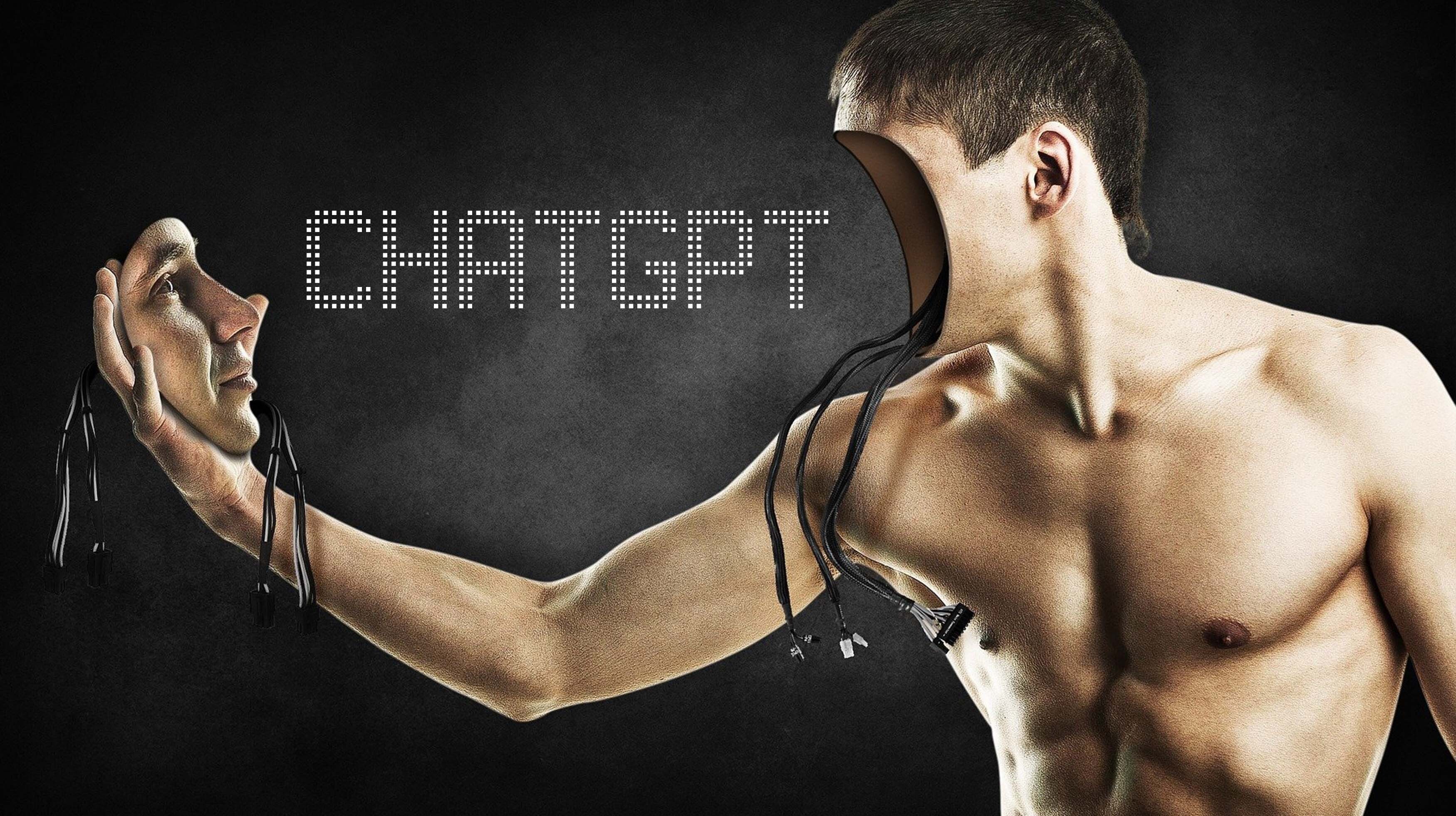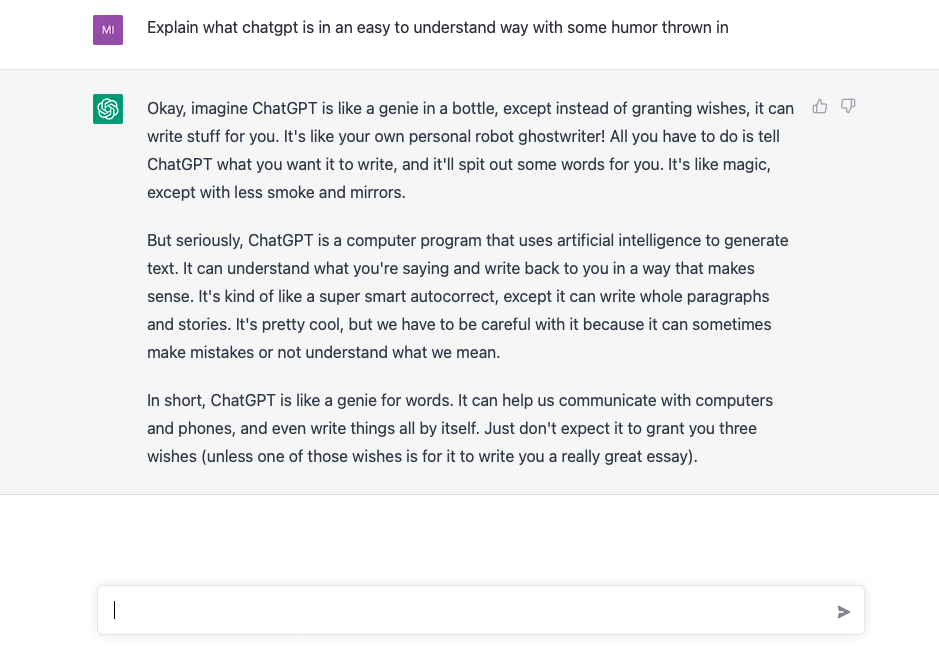ChatGPT: Our New Robot Overlords
Artificial intelligence has become so advanced that it can be nearly indistinguishable from human work products. One example is OpenAI’s ChatGPT – a program capable of writing everything from creative works to computer coding. But what are the harms and potential pitfalls of this technology?

Today, we’re going to be talking about ChatGPT. If you haven’t heard about this, it’s the latest and greatest language generation model. It’s developed by OpenAI. And let me tell you, this thing is surprising everyone… and scaring the crap out of some people too.
So what is it? Imagine ChatGPT is like a genie in a bottle, except instead of granting wishes, it can write stuff for you. It’s like your own personal robot ghostwriter! All you have to do is tell ChatGPT what you want it to write, and it’ll spit out some words for you. It’s like magic, except with less smoke and mirrors.
But seriously, ChatGPT is a computer program that uses artificial intelligence to generate text. It can understand what you’re saying and write back to you in a way that makes sense. It’s kind of like a super smart autocorrect, except it can write whole paragraphs and stories. It’s pretty cool, but we have to be careful with it because it can sometimes make mistakes or not understand what we mean.
ChatGPT is like a genie for words. It can help us communicate with computers and phones, and even write things all by itself. Just don’t expect it to grant you three wishes.
So let’s talk about the surprising things ChatGPT can do. I mean, this thing can do everything! It can have a natural conversation with you, it can translate languages, it can summarize long articles in seconds… it’s like a Swiss Army Knife of language generation. And it’s even got a “no copy” mechanism to make sure it’s not just regurgitating the same old stuff it’s read before.
But here’s where things get a little scary. ChatGPT is getting so good at generating text that’s indistinguishable from human writing, some people are starting to worry about the potential for AI-generated propaganda or fake news. And who knows what other nefarious uses it could be put to in the future? It’s like, we’ve created this super intelligent AI and now we have to just hope it doesn’t turn on us like in some sci-fi movie.
But hey, we can’t let fear get in the way of progress, right? And besides, ChatGPT has a plagiarism detection feature to help catch any accidental violations of copyright. So we can all rest easy knowing that our AI overlords are being held accountable.
Speaking of our AI overlords, some people are worried that ChatGPT is going to put all the human writers out of business. But come on, how could a machine possibly capture the nuanced beauty of the human experience? Oh wait, it already did. In a recent study, ChatGPT generated a piece of fiction that was so good, it was mistaken for a human-written story. Looks like we’re all going to have to learn how to code if we want to keep our jobs.
But don’t worry, ChatGPT is still just a machine. It doesn’t have feelings or desires… yet. I mean, it’s not like it’s going to start writing love letters to itself or anything. That would just be ridiculous.
ChatGPT is surprising everyone with its capabilities and scaring some people with its potential for misuse. But hey, as long as we don’t accidentally create Skynet and wipe out humanity, I think we’ll be okay.
ChatGPT, or Chat Generative Pre-training Transformer, is a natural language processing tool that has gained a lot of attention in recent years for its ability to generate human-like text. While ChatGPT has the potential to revolutionize the way we interact with technology and make our lives easier, it also has some significant drawbacks that should not be overlooked.
One major concern with ChatGPT is that it can potentially be used for malicious purposes. Because it can generate realistic-sounding text, it can be used to create fake news or misinformation. This has the potential to cause widespread confusion and harm to society. For example, if ChatGPT is used to generate fake news articles, it could spread false information and lead people to make decisions based on inaccurate information. This could have serious consequences, such as causing panic or harm to individuals or groups.
Another issue with ChatGPT is that it can perpetuate harmful stereotypes and biases. Because it is trained on large amounts of data, it can learn and replicate biases that exist in society. This means that it may generate text that is offensive or discriminatory towards certain groups of people. This is a significant problem because it can contribute to the normalization of harmful attitudes and behaviors.
In addition, ChatGPT could potentially be used to impersonate individuals or organizations. I asked users of Reddit for their concerns about the technology, and one user, __Hi__Bye, said “My main concern is this can be used to imitate human behavior. Imagine a really crazy stalker hacker that programs this to talk in a chat or a text message conversation and imitate someone’s family members so that the stalker can fool them into thinking they are talking to a family member and not a stalker. there might be a scenario where someone feeds it data from say a facebook profile and it learns how to talk like that person right down to the slang. how would the person be able to tell the difference? We already have ai imitating peoples voices, how do we know it’s not already happening? It can be weaponized and that worries me more than any other concern i Carry about it”
Because it can generate realistic-sounding text, it could be used to create fake social media accounts or websites that appear to be legitimate. This could be used to defraud or manipulate people, causing harm to individuals or groups.
There are also concerns about the potential for ChatGPT to be used for nefarious purposes by governments or organizations. It could be used to create fake social media accounts or websites for the purpose of spreading propaganda or manipulating public opinion. This could have serious consequences for democracy and the free exchange of ideas.
Finally, ChatGPT has the potential to displace human jobs. As it becomes more advanced, it could potentially be used to perform tasks that are currently done by humans. While this could make certain tasks more efficient, it could also lead to job loss and economic disruption.
History has shown that as industries evolve, new job opportunities arise. Just look at how the internet has created entire industries that didn’t exist before. I have a feeling the same will happen with AI.
And then there are the people who claim that AI is going to become smarter than humans and turn on us. First of all, let’s not forget that AI is created and programmed by humans. So if it does somehow become smarter than us and decide to take over the world, it’s our own darn fault. But seriously, this fear is just ridiculous. AI is a tool that can assist us in tasks, but it doesn’t have the ability to feel emotions or have its own motivations. It’s not going to suddenly become a power-hungry megalomaniac.
And as for ChatGPT, well, it’s just a computer program. It’s not some sentient being that’s going to take over the internet and start spewing out fake news. It’s a tool that can generate text based on the information it’s given. It’s not going to start generating its own opinions or creating its own content.
Has AI ever gone wrong? One example of a failure in artificial intelligence is the “Therac-25” incident in the 1980s. The Therac-25 was a medical linear accelerator (a device used to treat cancer patients with radiation) that was controlled by a computer program. Unfortunately, the program had a bug that caused the machine to administer deadly overdoses of radiation to some patients. In total, six patients were harmed and at least three of them died as a result of the malfunctions of the machine.
There were a number of factors that contributed to the failure of the Therac-25. One was that the software had been developed by a small team of programmers who were not fully aware of the potential dangers of the machine. Additionally, the machine’s safety features were not adequately tested before it was put into use. Finally, the software bugs that caused the overdoses were not identified or corrected until several patients had already been harmed.
The incident was a tragic reminder that even small mistakes in software design can have serious and fatal consequences. The Therac-25 incident also highlighted the importance of rigorous testing, proper training and oversight, and transparent communication in the development and use of AI technology.
Another example of a failure in artificial intelligence is the “Pac-Man Diversion” in the early 2000s. Pac-Man is an AI agent designed to control traffic lights, it was implemented in the city of Las Vegas for an experiment in 2000. However, it ended up causing huge traffic congestion and delay for the drivers, Pac-Man’s algorithm was only focusing on minimizing delay time for the cars but didn’t take into account the amount of cars on the road, that cause the traffic jam. The algorithm was causing cars to get stuck at red lights, causing long delays and leaving drivers frustrated. The City of Las Vegas eventually had to switch back to traditional traffic lights.
This incident is an example of how AI can fail when it is not able to properly take into account all the different factors that may be affecting a situation. It also illustrates the importance of testing AI systems in realistic environments and monitoring their performance closely to quickly identify and address any issues that may arise.
It’s also important to mention that not only the lack of testing, but also the unrealistic goals that the agents were set to achieve, in this case minimize the delay time but not taking into account the total traffic on the road.
It’s important to consider the ethical implications of AI and make sure that it’s being used for the betterment of society. But let’s not let fear and paranoia cloud our judgment. AI and ChatGPT have the potential to do a lot of good in the world, and we shouldn’t let the critics hold us back.
Do you think you could tell the difference between AI-generated text and text written by a human? As AI continues to advance, it is becoming increasingly difficult to distinguish between the two. While some may argue that AI-generated text lacks the creativity and nuance of human writing, others claim that it is virtually indistinguishable. What do you think?
Well I have a secret to reveal: this entire podcast – from beginning to end – was actually written using Artificial Intelligence! That’s right, all of the ideas, quips, and insights you’ve heard throughout this podcast were generated by a computer program. While AI has the potential to revolutionize the way we create and consume media, it’s important to remember that it is still a tool created and programmed by humans.

Review this podcast at https://podcasts.apple.com/us/podcast/the-internet-says-it-s-true/id1530853589
Bonus episodes and content available at http://Patreon.com/MichaelKent
For special discounts, visit http://theinternetsaysitstrue.com/deals


